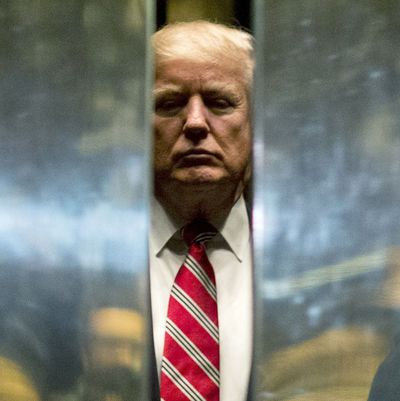
Last night, the Daily Mail reported a development in the Michael Cohen saga of seismic scale. In a December 2016 meeting in Trump Tower, the British tabloid reports, Cohen asked Ahmed Al-Rumaihi, who runs a $100 billion Qatari investment fund, to send him “millions” which, the story claims, would go “through him to Trump family members.”
We have already learned of multiple cases of Cohen using his access to Trump to jack up multiple corporations for outrageous sums. The Daily Mail report deepens the trouble in two crucial ways. First, it extends Cohen’s scheme from domestic corporations (or, in one case, domestic corporations controlled by foreign entities) to direct overseas fundraising. Second, and more ominously, it alleges that Cohen funneled the money to Trump’s family. It was bad enough that Trump’s lawyer was enriching himself by cashing in on access. Now the story suggests he was enriching them, transforming the Cohen bribery story into a Trump bribery story.
The story’s publication did not reverberate with the explosive force proportional to the scale of the allegation. The reason is that the Daily Mail lacks the familiarity and credibility of major American legacy media firms. Its occasional bombshell scoops reside in a never-never land between rumor and accepted fact.
And yet there is plenty of contextual evidence to support the charge. One is that, after Stormy Daniels’s lawyer Michael Avenatti published Trump Tower surveillance video of Al-Rumaihi, he suspiciously denied attending the meeting, only for his firm to admit it later. Another reason is that, multiple reports have linked both Qatar as a source of players in the broader web of shady Trump financial dealings with Russia, and Cohen as a key conduit. So it would fit the pattern for Cohen to be soliciting a bribe from Qatar on behalf of the Trump family. And yet another reason is Trump’s notorious resentment of other people making money off of him. If Cohen used Trump’s election to solicit bribes, it seems highly likely Trump would demand a taste.
And then there is another reason to credit this allegation: Direct bribery of Trump is still happening, in plain sight.
Trump has defied all modern precedent by retaining control of his family company while serving as president, allowing interests domestic or foreign to curry favor by enriching him personally. One such case occurred this week. In short order, China invested half a billion dollars into an Indonesian infrastructure project that will benefit a Trump property, and Trump then immediately turned around and gave China a curiously favorable trade concession.
What makes the case so suspicious is that, while Trump has repeatedly mocked China and threatened to pick fights with it, the issue at hand involves China engaging in unambiguously bad behavior. ZTE, the Chinese telecommunications firms, admitted to violating U.S. sanctions on both North Korea and Iran. (Ratcheting up sanctions pressure on Iran is now a centerpiece of American foreign policy in the Middle East, thanks to Trump’s decision to back out of the nuclear inspections agreement.) The U.S. Department of Commerce found ZTE also failed to accept the terms of punishment.
But rather than express nationalist indignation, Trump instead proclaimed his bizarre sympathy that the penalties would hurt Chinese workers (“Too many jobs in China lost”), in what has to be the first time Trump has ever evinced any concern about the well-being of the Chinese labor force. His capitulation left China trade hawks apoplectic. “It’s outrageous,” American Enterprise Institute scholar Derek Scissors, a critic of Chinese trade practices, told The Wall Street Journal. “We are giving up on punishing ZTE for the Chinese restoring the trade status quo.”
It is obviously possible that this sequence of events might be the product of pure incompetence. But immediate progression from Chinese payment that benefitted Trump to oddly worded Trump tweet to oddly designed concession to China suggests bribery as a more likely explanation.
What’s clearly true is that the usual restraints against such behavior are altogether absent. There is an old phrase that used to be bandied around the media constantly: “the appearance of a conflict of interest.” Officials were held to this standard, which required them to avoid even looking like they might be tempted to allow their personal interest to influence their decisions. And of course, petty corruption often won out even in the face of this putatively strict public ethic. But it had to travel through a wicket of rules guarding against outright corruption.
The Trump family, by contrast, is operating in a rules-free environment. The appearance of a conflict of interest is not even in question. There are proven conflicts everywhere, and the only question is straight-out quid pro quo bribery. The only authority empowered to uncover the alleged bribes is Robert Mueller.
While federal officials below the level of president are subject to rigid disclosure and divestment rules, the president has refused to disclose his personal financial information at all. In normal times, Congress would immediately hold hearings to get to the bottom of the ZTE deal, which would generate screaming headlines. In this case, everybody has so fully internalized the reality that congressional Republicans will not conduct any oversight over this administration that a serious congressional probe is unimaginable.
Is Trump collecting bribes? Did Cohen collect bribes for Trump in December 2016? What on Earth would stop them?






























